#epithet exchanged
Explore tagged Tumblr posts
Text
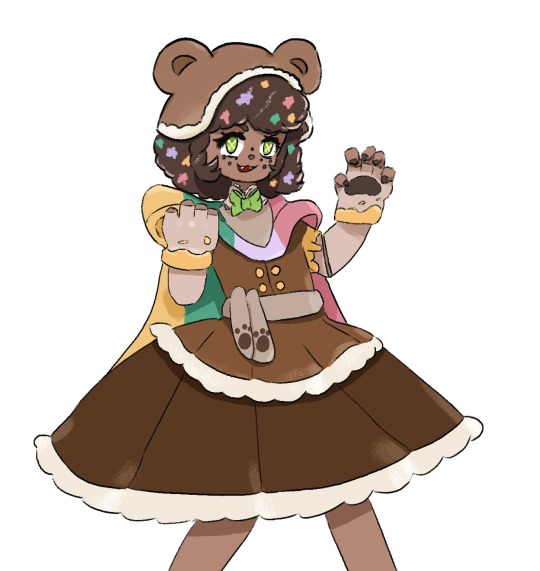
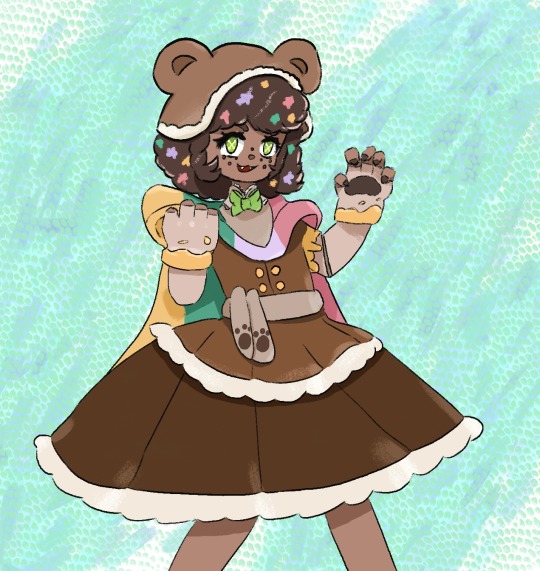
Fanart for @zemoleinyourtrashcan's AU epithet exchanged! (+ me playing around with ugly wanna be backgrounds because I'm bored)
I ended up playing around with the design a bit and made a few changes because....idk inspiration or sum so it isn't fully accurate but I still like it
(don't mind me for some reason having thought it's called epithet replaced that never happened you're from a different timeline if you have a memory like that)
#epithet erased#epithet erased fanart#daily molly blyndeff#daily molly#molly blyndeff#epithet exchanged#epithet erased ff
37 notes
·
View notes
Text
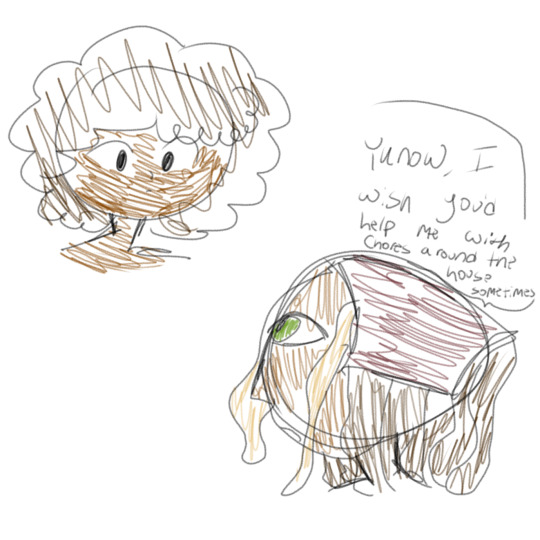
LORELAI: Yknow, I wish you’d help me with chores around the house sometimes.

MOLLY: CHRIST you’re extremely fucking SELFISH,
DIE
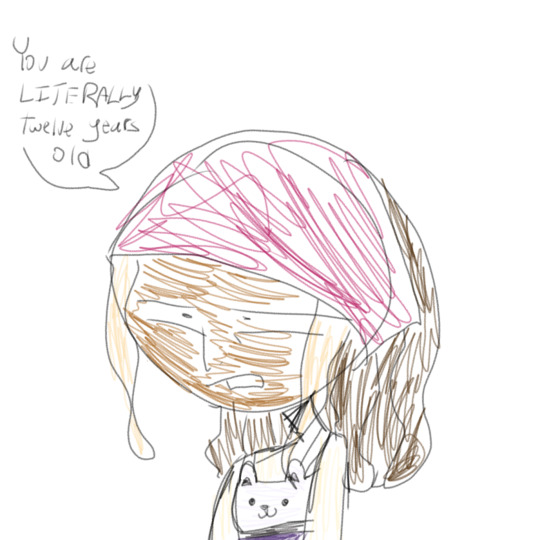
LORELAI: You are LITERALLY twelve years old
#epithet erased meme#epithet oc#epithet erased au#epithet erased fanart#epithet erased molly#epithet erased#epithet spoilers#epithet erased prison of plastic#epithet erased headcannons#molly blyndeff#lorelai blyndeff#swap au#epithet exchanged au#Epithet exchanged#Swap au#thats it#thats their dynamic guys#art#digital art#fanart#epithet erased oc#prison of plastic
16 notes
·
View notes
Text
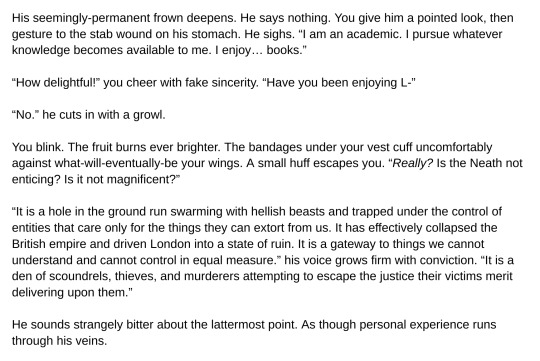

i always write really normal really relaxed guys that are really chill and always go with the flow
#my writing#am i cringe enough to put this in the main FL tag. am i really.#unfortunately yes#fallen london#The Doomed Scientist is still caeru's epithet#the scoundrel just doesn't know him so he's The Stranger#also hi im yin the insane guy who writes in second person for fun. i think it's infinitely easier and more relaxing than any other pov#yes there is also something wrong with me#i dont usually post snippets like this to tumblr i just thought this exchange was funny#and also vital character establishment for the like 4 tumblr girlies invested in the yin FL oc lore. the scientist is just like that.#scoundrelventures
11 notes
·
View notes
Text
Uh oh you flew to close to my hyper fixation now I have to talk about it XD
(tldr: It’s really important to analyze queer mythic figures in their historical context. That being said, the fact that Dionysus has faced this level of scrutiny regarding his gender and sexuality may suggest that the ways Dionysus was being depicted/worshipped could have been queer in the contemporary context.)
I think historical context when discussing figures like Dionysus is super important and really fun. You’re so right that there’s so much conflation of actual Dionysian/Orphic practices with later Christian writings that were meant to trivialize Dionysian myth. Even way older than that actually, the Athenian state did not like the cult of Dionysos bc it wasn’t registered with the government (and bc it empowered women but that’s a whole other story). I need to look into this epithet In particular though— I’ve not seen it a ton in actual sources older than the Byzantine period. I’d love for you to send me some sources to look at though.
—
I’d actually argue though that you lay out some really solid evidence for Dionysus actually being a queer figure at the time of his worship.
I would agree in saying he’s not trans, or even gay. Those are modern terms created in a western, 19th/20th century context. However, queerness is an academic term that denotes expressions of gender and sexuality that break the norms of a specific culture. (I’ll reblog this with some good articles when I get the second)
A lot of the derogatory language, that actually references real practices surrounding Dionysus, I think actually is more evidence of him being queer in the context. As long as those derogatory statements can be traced back to contemporary portrayals obv.
It’s 100% true that being in mlm relationships was not inherently queer (also this depended on the time and area.). In Athens, it wasn’t queer to be in a sexual mentorship. Being in an equal mlm relationship than would be queer. This is where you usually see the whole ‘bottom is derogatory’ language. It’s a very Athenian thing lol. This though was different than Thebes, in which sexual relationships between men on equal standing was not queer if done in the context of warfare. (I’m making generalizations obv and these things are very Classical period specific).
But like you point out, male figures depicted as playing the younger, feminine, or more bluntly “bottom” role in the relationship were commonly mocked (especially in late-classical Athens in particular, and later).
This though is queer. Dionysus is performing a gender presentation that is out of the norm (because in this case sexuality does connote a separate gender presentation. The two are tied. A modern example would be like how Butch is a specific gender presentation that also implies the person’s sexuality). Even when this is depicted in comedy etc if it’s in a contemporary time all depictions are adding the to cultural idea of a queer Dionysus.
I would (and have lol) argued that there are a lot of Greek figures that actually are queer because in context they are breaking gender norms that we today don’t notice. Big examples are any man who swears off women and/or marriage. This often leads to their downfall due to them breaking these norms— and then implying that that specific presentation of masculinity is wrong and likely a queer presentation. Further more, a lot of older myths that depict queer relationships (that may not have been seen as queer at the time of their origin) often get reinterpreted as being deviant later on when norms have changed, or being reimagined to fit the new norms. This is all actually one of my favorite topics actually but I’ll hold back for now.
—
I think though that part of your argument seems to be that there isn’t a ton of evidence of Dionysus having gender play as apart of his worship irregardless of the cultural acceptance (I may have interpreted you wrong, I can’t tell if you meant the epithet specifically or w/ Dionysos’ gender-queerness overall).
For one thing, almost every cult (OG Dionysian cult, Orphic practices, Eleusinian, etc) that worshipped him was super secretive so we as archeologists are particularly screwed regarding that. However, from what we do know, there is a decent amount of evidence for this being the case. Like not that Dionysus was “trans”— he wasn’t a person or even worshipped like he was a person with a specific identity (i.e hero cults). Like he’s a concept— greek gods were NOT treated as anthropomorphic deities like some other pagan pantheons despite how modern depictions describe them (this is also a way more complicated topic)
However, him having a some-what fluid gender is pretty well documented. I mean the Bacchae (Euripides) characterizes him as an effeminate and with a man (Pentheus) lusting after him. Pentheus id mocked for cross dressing though so make of that what you will. I’ve seen a decent amount of articles arguing that the Bacchae is based on actual rituals but you know Euripides is a silly guy XD. That play is definitely all about breaking gender roles but it’s hard to know if it wasn’t just Euripides commenting on stuff. He’s pretty much the oldest concrete depiction of Dionysus like that besides the Homeric Hymns which I’ll talk about.
It’s honestly really hard to find older sources about Dionysus at all ya know, mystery cults. The story that comes up the most is the one w/ Dionysus being disguised as an effeminate young man.
The earliest example of Dionysus being depicted as somewhat androgynous (I mean the adj not the epithet) is in Homeric Hymn 7. It could be older than the Bacchae actually but Euripides goes really in detail lol. Ovid (much later but still contemporary with Orphic worship) goes super into detail about how girlish Dionysos was in this story ha ha but that’s bc it’s a retelling of the Bacchae and gender is a big theme there like I mentioned.
There is also the story of Dionysos being raised as a girl. The earliest mention of that is from Apollodorus I think from the late Hellenistic period.
However, in art, there is a big swing after the Bacchae of Dionysus being depicted as androgynous and young. There seems to be some thought that Euripides was the cause of this but it’s kind of a chicken and egg scenario.
It’s very likely that the oral storytelling of these myths are obviously far older but it is true it’s hard to know how much it was influenced by that late Classical shift towards effeminate Dionysus. There is Archaic pottery of Dionysus turning pirates into dolphins, however he’s depicted as already revealing himself and at this point is depicted as a bearded man.
More generally, from what I’ve seen the more androgynous depiction of Dionysus really gets popular in the late classical period. I do think though even before this Dionysus is depicted as being primarily worshipped by or at least surrounded by women, which I think hints to a non-standard relationship to gender especially in a patriarchal society (though the extreme gender norms was really an Athenian thing specifically, so take that with a grain of salt).
Overall I think reconsidering how queerness applies to ancient culture is super fun! I’d love to know other people’s thoughts.
I have been seeing some posts for Dionysos Androgynos popping up lately with lovely prayers and offerings ! this is wonderful, but it makes me want to clarify something. His epithet Androgynos is not related to gender identity as we know it now nor was it used in worship denoting queerness. I have seen people talking about this epithet being worshiped but there isn't much tangible evidence for that (that I know of).
it generally means "man-woman" and it refers to the position a man takes during sex—"both taking and receiving penetration during sex". being a man who was in the woman's role during sex wasn't a flex back then, they were seen as naive and lesser than the older man on top. I've seen suggestions that this epithet (along with "chickpea Dionysos") may have been used more derogatorily.
Dionysos is a wonderfully queer deity in the modern age, but we have to remember Ancient Greece is an entirely different culture and ideas. we can't directly exchange values with a culture 2,000 years removed from us. It's totally fine to reclaim this epithet, but claiming it is historically a trans epithet is incorrect.
#Btw I think you are super super cool this isn’t meant in a mean way#I really like talking / debating ppl about this#none of this is meant as aggressive or mean I’m just autistic lol#this is no hate I’d love to know your thoughts#it’s so cool seeing someone else analyzing Dionysus like this 🫶#dionysos#dionysus#dionysos androgynos#greek mythology#I really can’t find anything reliable about androgynos as an epithet. I feel like it may not even be contemporary with him at all#also I do need to look into the dates regarding the epithets you’re referring to that’d add context#also do you have the sources for the epithets being derogatory?#Roman and Christian era Dionysus bashing is so fucking funny to read#It is really annoying though when people mix up actual Dionysian worship with sources that are mocking him#like there are so many Christian era sources that are trying to trivialize Orphic and Dionysian practices bc they were still kicking around#like you see a lot the parable of Dionysus promising to have sex with some king in exchange for a favor but the dude dies.#so Dionysus rides his corpse or grave or something. it’s totally a Christian joke not a real story#As far as I know Dionysus doesn’t have any relationships with him as the feminine role#but also like#that’s bc that whole dynamic was really Athenian specific and these myths are not from there#Side note but using this context of queerness I definitely think Athena was a queer figure in classical Athens#There are 100% writings of dudes trying to figure out how Athena and their fucked up Athenian standards could exist at the same time XD#That isn’t to say she was hated obv not but she was depicting a gender presentation that contradicted social norms#when it comes to discussing if certain pre-19th c. historical figures could be categorized as trans that’s a whole other topic that I think#I think genderqueer is a bit of a better umbrella but also I think the politics of identifying examples of people transitioning is the past#can obv be powerful so it’s case by case imo#queer#transgender#queer history
319 notes
·
View notes
Text
Collection of writing resources I've gathered. Grammar, prompts, general writing advice, research tools, thesauruses (or thesauri 😉)... Enjoy!
General
English Language and Usage Stack Exchange
UW Madison Writing Center - Grammar/Punctuation rules/basics
Wheaton College Writing Resources
UNC Writing Tips and Tools
Purchase College Editorial Style Guide
Writing Forum - The Writing Process
Absolute Write Forum
English Plus Grammar Slammer
Onelook Thesaurus
Online Etymology Dictionary
Literary Devices
Fiction Writing
Instead Of...Simple Writer's Guide by anaemicc
'How to Become a Better Writer' by @tapwrites
'50 Tips for (Fanfic) Writing' by @ao3commentoftheday
Fic Writing Advice by @radioactive-earthshine
'How to Exploit Facial Expressions' by Kathy Steinemann - absolutely check out the rest of the site too, it is a goldmine.
'Writing Inspiration and Resources' by Bryn Donovan - some digging required but there's tools here for everyone.
'World Building and Writing Advice' + a brilliant list of Prompts, Scenarios, and Dialogues by @pendarling
Writing Questions Answered Masterlist
One Stop for Writer's Character and World Building Thesaurus
ProWritingAid Emotions Thesaurus
Descriptionary - it's...ways to describe things. Just check it out, lmfao.
Neurodivergent Fic Writer's Advice by @bookishdiplodocus
The Sexy Stuff
KJ Scott's Lewd Vocab Survey Results
'The Smutwriter's Dictionary' by @maybeeatspaghetti
Laurel Clarke's Sexy Thesaurus
Quinn Anderson's Ultimate Guide to Writing Smut
Smut Writing Tips + Smut Thesaurus by @prurientpuddlejumper
'How to Write Smut' by @bohemiantea-scorpiocoffee
Defying Labels by @pasiphile
Misc.
Tropes
Case Converter
Fake Text Message Generator and Another Fake Text Message Generator for your fics
Epithet Flowchart
Historical Timeline of Slang
Fashion History
Writing Realistic Injuries
Hiveword - Search Engine specifically for writing tools
Mythbank - Sort of a world mythology encyclopedia
Skeptic's Dictionary
Written Sound Onomatopoeia Dictionary
LitCharts Shakespeare Modern Translations
Stanford Geospatial Network Model of Roman World
Writing Sketchy Topics by @wordsnstuff
Writing Scents by @thewriteadviceforwriters
Ao3commentoftheday Beta Reader Checklist. Actually, for AO3 tips/basics/everythings you just really need to get yourself to ao3commentoftheday's AO3 and read everything there. Including their bookmarks!
#writer resources#fanfic writers#writing resources#writers#fanfiction#writing advice#writing tips#how to write#writer tools#writing
1K notes
·
View notes
Text

Relationship: Sakura Haruka x Florist!Reader Content Tags: First Meetings, Strangers to (eventual) Lovers, Wound Tending, Sakura is a good citizen, Hanakotoba (obv), Koi no Yokan, Everyone's in their early 20s, the use of epithets for Suo and Nirei until their names are learned, References to their nomenclatures Summary: A month after moving back to Makochi, you were saved from being mugged on your way home. After your saviors walk you home to ensure your safety, you can't help but want to repay their kindness by patching them up. Word Count: 2.7k
A/N: This idea has been haunting me since the beginning of April. It was supposed to be a little Ha-Ha funny joke between friends and it somehow snowballed. Thank you @owoasis for letting me talk your ear off about this and Haruka for the past couple months. Tagging @kweenkatsuki-fics because you've also been instrumental in this becoming a thing 💜 Kinda relevant: I see Nirei as becoming a school teacher, probably for elementary or middle school. By the time Florist moves to Makochi, he stopped dyeing his hair and it's his natural color.

Illuminated by the street lamp, the maple tree that sits at the edge of your yard glows and you’re surprised by the reluctance that pulls at your heart at the sight, the signal of your impending separation. It’s been some time since you’ve felt so at ease with strangers, much less the odd trio escorting you home.
A glance to your left shows your two-toned savior more comfortable than he has been since dispatching your would-be muggers. The steady blush that dusted his cheeks is gone, though you’re somewhat crestfallen at its absence. You’ve grown a little fond of the sight, its easy appearance at his friends’ light ribbing.
Without effort, your lips shape into a smile as you slow, different from the customer-service one you’ve worn all day. “Well fellas, we have arrived,” you say, turning on your heel to meet their faces.
Eyepatch and Freckles both reciprocate your smile as they come to stop at the opening of your path while your savior brings his right hand to rub the back of his neck. Red stains his knuckles and you swear there’s some swelling.
Your smile fades and your brows stitch together as concern grips your chest. “Are you hurt?”
That flush returns, spreading across his cheeks as his hand freezes in its ascent. Bringing it before his face, he assesses his knuckles before flexing twice. Though he tries to hide it, you’ve been around your brother’s training long enough to know what to look for. The corners of his lips downturn and his face tightens imperceptibly before trying to relax—you can hear the words before he speaks them.
“Don’t worry. ‘M fine.”
Your eyes track the fall of his hand, its profile looking a little fuller than his left.
“Please let me help.”
The two behind him exchange glances but seem almost… tickled by the development, appearing to be in no hurry to return to their evenings.
“What—? No, it’s fine.”
“Sakura, don’t be rude!” Freckles objects, playfully chastising him as though they’ve done this song and dance hundreds of times before.
Pressing your lips together, you try to stifle your smile for another reason. Sakura? Is that his name, or a nickname? Certainly, if you were friends, his propensity for blushing might earn such a name from you. As it is, Freckles’ school teacher look and particular earnestness has you thinking it might be his name, which makes it almost feel like fate.
“Please,” you repeat, more emphatically this time. “It’s the least I can do after you put yourself in harm’s way for me.”
It doesn’t matter if he dropped your assailants with the skill of someone who’s done this many times before; they still brandished knives, meaning this stranger risked quite a lot on your behalf.
With a sigh, he relents, following you as you lead them up the path to your house. You gesture to the bench in front of your closed amado, satisfied to hear their diverging footsteps, entering the yard you’ve yet to turn into a garden. Flicking on the garden lights, you ask them to wait outside while you grab your supplies.
Out of habit, you’ve kept the first aid kit near your kitchen sink, and retrieving it has you remembering the countless evenings you’ve spent patching up your brother following his training sessions with your father. Moving to Makochi, you expected some incident or other given its history (even if your grandmother insisted things were better since the establishment of Bofurin eight years ago). Honestly, you wished you had left this life behind, but by the same token, you don’t mind that it allowed you to meet these three. As you prepare a bowl with ice water and epsom salt, you can’t help but be grateful for your prior knowledge.
Their voices carry in the silence, some comment about old habits dying hard and a sharp bite about how he couldn’t wait for the night patrol to act. Upon the sliding of your door, they fall quiet, allowing the calm of the night to settle in your bones as Sakura’s friends observe you with clear amusement.
“Thank you for sticking around.” Thank you for so much more.
Watching as you set everything up, he waits for you to look at him before joining you on the bench, precariously perched on the edge as though reluctant to make himself comfortable. When you hold out your hand, you half-expect him to hesitate.
“I-I wouldn’t have bailed after you asked,” he says, voice trailing off as he places his hand in yours. He turns toward your amado rather than face his friends, apparently unable or unwilling to look at either you or his friends. The calluses on his palm are similar to those you’ve grown used to, denoting years of martial arts experience. His hand is warm to the touch and his fingers twitch when you adjust your hold.
“It’s cold,” you warn, guiding both your hands into the cold water.
He hisses, nearly jerking his hand out of your grasp before stopping himself, the water coming to splash the bench. “Shit, that’s freezing!” His face twists in mild discomfort before morphing into something apologetic, eyes landing on yours. “Sorry, I didn’t mean—”
Your laugh interrupts him and he relaxes, letting you gently feel around the abrasions on his knuckles. “It’s fine. I’m used to this.”
Glancing up, you find him watching from the corner of his steel blue eye, his blush spreading toward his ears as you make eye contact. Desiring to offer him a small mercy, you return your attention to his hand, bringing it from the water now that the blood has been washed away. It looked worse than it is, though there’s still some swelling—he was likely telling the truth when he said it was fine, but you’re grateful he allowed you to help regardless.
“It’s probably rude that I’ve waited so long to ask,” you start, submerging his hand once more to help reduce swelling, “but might I know the names of my saviors?”
“Ah, right!” Freckles steps forward just a bit. “I’m Nirei Akihiko! We probably should have introduced ourselves before offering to walk you home, huh?”
At least you’re not the only one who had a lapse in propriety (beyond their timely intervention, you’re glad these three found you, as calm and casual as they are).
“I’m Sakura Haruka.” His hand shifts in yours, fingers twitching where they meet yours, pulling your attention back. Not for the first time tonight, you’re mesmerized by his heterochromatic eyes, clear with pride and some other emotion as he lifts his chin a bit, looking at you head-on. Heat warms your cheeks under his attention, and it’s you who feels the urge to look away.
“I’m Suo Hayato,” he says, offering you an escape, something extra tucked into his perpetually genial smile.
It’s easy enough to return, to suppress your own fluster and provide your name. They roll it over in their minds, tasting the way it sits on their tongues, though they don’t speak it aloud. In turn, you consider their names, and your previous thought about fate comes to laugh at you.
“It’s nice to properly meet you all. Though…” They all pause and you feel the weight of their stares as you duck your head to hide your grin. “I have to say, it’s a little funny meeting the three of you as the new florist on Tonbu Street. From your names alone, I think you three are my new favorite people in Makochi.”
Suo graces you with a smile—genuine, this time, if you had to guess—and Nirei brightens beside him. Your eyes flicker to Sakura and you think that pink is becoming a favorite color of yours.
“Ah, so you’re the one who took over Hanami Flower Shop?” Nirei asks, pulling out a small notebook and pen from his pocket.
“I did.” After checking your watch, your fingers prod Sakura’s hand once more. “It was always the plan that I’d take over for my grandparents, but when my grandfather died last summer, those plans moved up. I’ve only been here for the last month.”
“That would explain why we haven’t run into you sooner,” Suo says. Sakura grunts, looking away by the time you look up.
“It would. The shop has kept me plenty busy.” Between establishing yourself and receiving Mother’s Day orders from nearly every family adjacent to Tonbu Street, you’ve scarcely had time for yourself. June looms ever closer and part of you worries how you’ll handle it alone.
A comfortable silence falls as you lift Sakura’s hand from the water, dabbing it dry with a clean towel. After a minute of watching you tend to his friend’s hand, Suo says, “You know, we used to assist with the deliveries for your grandparents.”
The implication is clear as he leaves the statement hanging. Despite your urge to check his reaction, you remain focused on Sakura’s hand, releasing it only after you’ve dried it to satisfaction. The way his hand hovers, awaiting your application of polysporin, makes you feel as though you two are old pros at this.
“So it was you guys who’ve been helping. They used to tell us that some ‘Furin kids’ would help out when they didn’t need to. You have my sincere thanks.”
“It was our pleasure,” Nirei says, his grin audible. “I’m sure we’d be happy to help you out, too!” A quick glance confirms the way he’s looking between Suo and Sakura, pressuring them to agree.
“Hey! Don’t volunteer us when you’re gonna be busy with the school!” Sakura barks, jerking toward Nirei as his hand closes around yours. Realizing what he’s done, he releases his grip and deflates, openly apologetic. “Th-That’s not what I— Dammit.” His eyes search your face, falling to your smile before he ceases his sputtering, and his hand relaxes in yours.
“You’re fine. I wouldn’t want to impose on you guys or assume any additional help.”
“It wouldn’t be an imposition. Right, Sakura?” Suo says, enunciating his name in a teasing tone.
Is it often that they prod and goad Sakura into action? If so, it seems to be something he tolerates. You tut as he moves his hand again, ceasing the movement, and though you keep your attention on preparing the wrap, you feel heat radiating off him, likely caused by another flush.
“I—! N-No, it wouldn’t be…” The words tangle on his tongue, tripping over one another while he formulates his response. He sighs as you move around his hand, wrapping his knuckles with gauze. As you secure it with tape, part of you wishes to grant him another mercy by keeping your attention down, but you haven’t that excuse anymore. As if waiting for you to meet his gaze, he speaks. “I… was actually lookin’ to help out last week, but I… didn’t see the ol’ lady around.”
“Oh.”
Again, heat sits high on your cheeks as your smile disappears, the thoughtfulness of his desire to help settling softly on your skin. He lets your fingers drag over his freshly bandaged hand for a moment. If you knew any better, you’d think there was something more to his words, but as it is…
“How unexpectedly courteous of you, Sakura!”
Sakura’s eyes snap to Suo and he half-rises from the bench, removing himself from your touch. Busying yourself with cleaning up, you try to contain your blooming attraction.
“Oh, shove off with that shit! I wasn’t tryin’—”
Your laugh rings out, interrupting his quick dismissal, prompting him to sit back down and look at you once more before his gaze falls back to his hands.
“They’re—you’re, I guess—busier this time of year,” he justifies, voice low.
“Between Mother’s Day and wedding season, business does pick up for the shop. It’s sweet that you thought of us.”
Despite his creeping blush, the way it climbs up his neck and deepens on his cheeks, he doesn’t look away from you, giving you a chance to appreciate him. In the low light of your garden lamps, you’re drawn particularly to the gold of his left eye. As you smile at him, he bites the inside of his cheek.
“I wouldn’t have much to pay you guys. I hardly have anything to offer thanks for tonight.” Nothing substantial, anyway. Nothing beyond— “Actually… would you three mind waiting once more?”
Giving you varying sounds of acceptance, you take your leave, gathering your kit and the bowl as you do. Nirei looks all too content while Suo smiles that smile at Sakura, eager to exchange words in your absence.
On your kitchen table sits a vase of campanula, perfect blooms that won’t make it into any of the arrangements that have been ordered. Though you doubt any of them know hanakotoba, the simple fact that you know will be enough. Quite literally another means of offering thanks.
After clipping them over your sink, you look up and meet the single California poppy left from your visit to Poppy Happy Square in the thin vase that sits on your windowsill. Clarity rings in your heart as you realize what has been lingering in the peripheral of your mind since first seeing Sakura’s golden eye.
With your flowers in hand, you meet the boys outside once more, gathered near your fence. Their eyes drop to your hands, surprise present in the widening of their eyes and the parting of their lips. Suo is the first to recover, offering you arguably the most gracious smile you’ve seen from him. He steps forward, hand outstretched to receive your offering.
“It’s not much, but I figured it’s the kind of thanks you might expect from a florist,” you say, passing him the white bellflowers.
Nirei accepts the purple ones with wide eyes, a ghost of a smile present as he turns them over in his grasp. Sakura can’t take his eyes off the remaining flowers, the pink campanula and the golden California poppy. You wait until he looks up, that spattering of pink present.
“Thank you for tonight.” Passing along the pink flowers, keeping the poppy as you try to find the words. It’s different from your previous gift, its meaning unrelated to your desire to gift it. Your fingers tingle where they hold the flower, the sensation spreading up your arms, anxiously dancing across your chest as you push it forward and say, “This is… Well, it’s because your left eye reminds me of one of my favorite flowers. I’d like you to have it.”
He takes it, fingers warm against yours for the briefest moment, unaware of the way the smallest brush of his touch sets you alight.
“It was a pleasure to meet you three. I hope to see you around town again,” you say, taking a beat, weighing their names in your mouth before breathing life into them. “Suo, Nirei, and Sakura—thank you.”
They warm, each looking at the flowers before returning to you.
“We’ll be certain to see you around,” Suo says, half-turning toward the street.
“It was really nice to meet you,” Nirei agrees, following.
Sakura lingers, still focused on the delicate blooms held between his fingers as he chews on his lip. His blush is present on his cheeks, spreading when his eyes meet yours, unexpectedly serious as his tongue stumbles over your name. Clearing his throat, he speaks it again, louder, though not without care, and that burning feeling behind your heart turns smoldering. “Thank you for patchin’ me up or whatever. A-and for the flowers.” His bandaged right hand comes to scratch the back of his neck and his eyes shift to the side. “See you around Tonbu Street.”
Your answering smile is involuntary, giddy and excited, only widening when his eyes flicker to you, catching sight of your grin before quickly looking away again.
“I’m looking forward to it.”
With a nod, he joins the others, offering you an awkward wave once his back is to you, his hand returning to the back of his neck. If not for the dimmed lighting offered by the street lamp, you might know for certain whether his blush truly extends to his neck, though you’re inclined to believe it to be no more than a trick of the light for now.
His voice replays in your mind, the deliberate way he spoke your name, and you feel it in your heart. Sakura Haruka has the potential to be someone important in your life. The edges of such a thought feel almost like an inevitability.

Flower Glossary:
Canterbury Bell/Campanula: Gratitude, Constancy
California Poppy: Do not refuse me
(header credit)

Hanakotoba Masterlist | Wind Breaker Masterlist | Next ❧
#sakura haruka x reader#wind breaker x reader#wbk x reader#sakura haruka fluff#✒.ix writes#hanakotoba.✒#wbk.✒
149 notes
·
View notes
Text
Since I've had some clown in my mentions claiming Nabokovs intent was to present Dolores as equally culpable echoing the good old "but what about her TEEN SEDUCTRESS powers to CONTROL MEN" let's collect some of what Vladimir "Strong Opinions" Nabokov said about the book and Dolly in particular:
"Some simply haven’t read the book or don’t understand it. It is not obscene; it has none of the dirt of many so-called realistic modern novels. “Most critics have failed to stress the pathetic side,” said Mrs. Nabokov. “It’s really a tragic story. Here, in the hands of this maniac is this poor girl—.” “And a very ordinary girl—” Nabokov put in…." (What Hath Lolita Wrought? Ithaca Author Distressed by Some Reactions,” Elmira Telegram, Dec. 14, 1958. )
"In Lolita, who’s the most likable person for you? It’s Lolita. It’s with her that the good reader should become friends. American readers, generally, talk of her as an unbearable kid, but you pity her as you would pity any kid. There’s something touching in her." (“While Lolita Travels Around the World, the Entomologist Nabokov and the Agronomist Robbe-Grillet Exchange Pawns on the Literary Chessboard”), Arts (Paris), October 28–Nov. 3, 1959, 4.)
"She came entirely out of my imagination. Critics, in general, find her odious; I pity her: an orphan, alone in life with a demanding forty-year-old. When I wrote about her last meeting with Humbert, I cried, like Flaubert at the death of Madame Bovary. “She cries every night, and the critics don’t hear her sobs,” said Mrs. Nabokov." (“Nabokov Without Lolita”, Nouvelles littéraires, Oct. 29, 1959, 1–2.)
"But she’s also a very touching character. Toward the end of the book, the reader and the author pity her, this poor child who has been sacrificed on the altar of motels. It’s very sad." (“The Good Mr. Nabokov: Lolita’s Father Forsakes Nymphets for the Sake of Pushkin and Robbe-Grillet”), L’Express, Nov. 5, 1959, 32–33.)
"Is Lolita amoral? On the contrary. It has a very moral moral: don’t harm children. Now, Humbert does [...] And Lolita, isn’t she a victim and not a little slattern….After all, haven’t I indicated the evil of all this, in giving Lolita a stillborn child?" (“Conversation, Vladimir Nabokov: He Likes Humor, Tennis and Proust. He Hates Communists, Sade, Freud”), L’Express, Jan. 26, 1961. )
"How, then, do you explain the “Lolita cult”? How do you explain all these girls who move, act, dress, and talk like Lolita? I wouldn’t know. Perhaps it is a result of the way the popular press has distorted my poor Lo. It has come up with something that has absolutely nothing to do with the book or Lolita the character. Lolita is the story of a sad little girl in a very sad world. The “Lolita cult” is something completely different." (“Love Today: How the Author of Lolita Sees It”), L’Europeo, June 23, 1966, 28–33. )
"Humbert Humbert is a vain and cruel wretch who manages to appear “touching.” That epithet, in its true, tear-iridized sense, can only apply to my poor little girl." (Paris Review, The Art of Fiction No. 40, Issue 41, Summer-Fall 1967)
"Lolita isn’t a perverse young girl. She’s a poor child who has been debauched and whose senses never stir under the caresses of the foul Humbert Humbert, whom she asks once, “how long did [he] think we were going to live in stuffy cabins, doing filthy things together…? [...] It is equally interesting to dwell, as journalists say, on the problem of the inept degradation that the character of the nymphet Lolita, whom I invented in 1955, has undergone in the mind of the broad public. Not only has the perversity of this poor child been grotesquely exaggerated, but her physical appearance, her age, everything has been transformed by the illustrations in foreign publications. Girls of eighteen or more, sidewalk kittens, cheap models, or simple long-legged criminals, are baptized “nymphets” or “Lolitas” in news stories in magazines in Italy, France, Germany, etc.; and the covers of translations, Turkish or Arab, reach the height of ineptitude when they feature a young woman with opulent contours and a blond mane imagined by boobies who have never read my book. In reality Lolita is a little girl of twelve, whereas Humbert Humbert is a mature man, and it’s the abyss between his age and that of the little girl that produces the vacuum, the vertigo, the seduction of mortal danger. Secondly, it’s the imagination of the sad satyr that makes a magic creature of this little American schoolgirl, as banal and normal in her way as the poet manqué Humbert is in his. Outside the maniacal gaze of Humbert there is no nymphet. Lolita the nymphet exists only through the obsession that destroys Humbert. Here’s an essential aspect of a unique book that has been betrayed by a factitious popularity." (“Apostrophes: Bernard Pivot Meets Vladimir Nabokov”), live television interview, Antenne-2 (Paris), May 30, 1975.)
And let's close with my blog title:
"Lolita is an indictment of all the things it expresses. It is a pathetic book dealing with the plight of a child, a very ordinary little girl, caught up by a disgusting and cruel man….But of all my books, I like it the best. " (Author of Lolita Scoffs at Furore over His Novel,” Niagara Falls Gazette, Jan. 11, 1959, 10B.)
Thanks for coming to his TED Talk
#vladimir nabokov#dolores haze#humbert humbert#think write speak#he really could not have made himself clearer#and he deserved a medal for not just biting people at some point
129 notes
·
View notes
Text
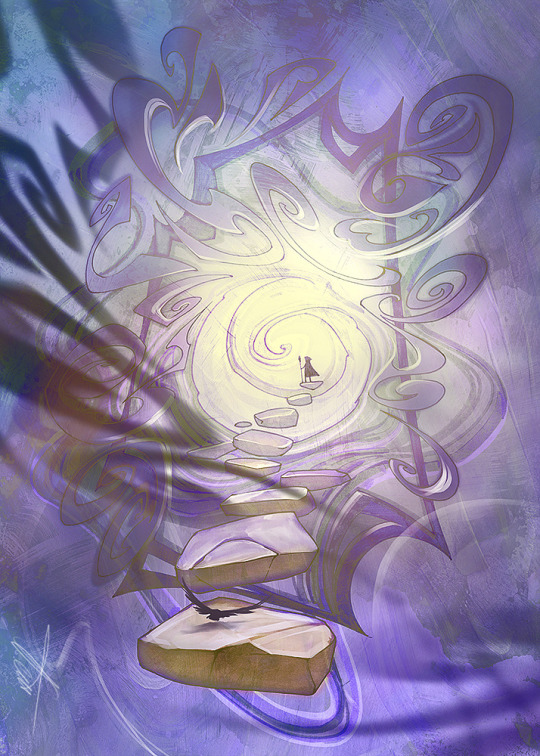
Deity: Boccob, the God of Magic for Magic's Sake
Artsource
It is strange (especially for those who view their relationship with the gods as transactional) that one might offer up prayers to a figure known widely by the epithet " The Uncaring". Why perform oath and ritual for a being that will not intercede on your behalf? Or grant you good favour in exchange for your sacrifices? Those that study the words of Boccob understand they have no need to beg for miracles when they have magic at their command.
Known to commoners as a god of magic, foresight, and balance, Boccob is not so much a deity as he was a great teacher, a philosopher-sage who's now ancient treatise on magic and council on it's use are as much an object of faith for many as a more ordinary god's scripture. In instructing his students how to be wizards, Boccob taught his students how to be good wizards, and these lessons form the ironshod foundations of innumerable magical traditions practised to this day.
Central to Boccob's teachings was the idea that magic was a path that must be walked to gain greater understanding, and that an adherent of this path should study, experience, and witness as much of its wonders as possible in order to become better arcanists, leading to the adoption of the open and unjudging eye as his symbol. Boccob himself followed this path to the outer planes and beyond, never to be seen again, leading many to credit Boccob with being the first mortal to climb the fabled infinite staircase, or perhaps even its architect.
Adventure Hooks:
Millennia after his (literal or figurative) ascension, a scroll containing hitherto unseen passages of Boccob's writings have been discovered in a crumbling library, setting off a disastrous chain of events as jealous archmages scrabble for the text like seagulls after a frenchfry. Their clashes are frequent, leaving the surrounding area scattered with hastily summoned servitors and all manner of misfired magic. Perhaps if the party is quick and clever they could sneak in and take the text for themselves, learning its wisdom or using it as a bargaining chip with one of these powerful spellslingers.
If it’s one thing Boccob’s Acolytes like almost as much as uncovering the arcane secrets of the universe, it’s proving their intellectual superiority by hiding their findings behind inscrutable riddles and logic games, the way The Uncaring did for his first pupils. Ledoran’s Labynthical Libram is an infamous example of this practice, a spellbook containing all manner of useful rituals and genuinely brilliant insights hidden behind a gauntlet of ciphers, mazes, and "gotcha" enchantments. Any self styled master of the arcane is likely to have a copy on their shelves, meaning that' it's only a quick looting spree away from ending up in the party's possession.
If "a wizard did it" is the answer to the age old question of "how?", "because they were listening to Boccob?" is the answer to the inevitable follow up of "why". Arcane crossbreeds, inexplicable puzzle dungeons, magical items amounting to bad jokes with bodycounts, all of these are created by The Uncaring's followers as a means of testing and expanding their abilities.
More of my adventures involving Boccob and his followers can be found HERE
Lets get into some philosophy...
While Ioun promotes the study of arcana for the sake of furthering knowledge, Mystra maintains and obscures the secrets of the weave, and Corellon glories in the wonders spellcraft might create , Boccob focuses on the pursuit of magical ability as a means and end of its own.
To Boccob, " I want to learn magic so I can be great/help people/make life easier" is a false start, because it ties the acquisition and understanding of magic to an external metric, encouraging the practitioner to take shortcuts with the magic to achieve their worldly desires.
Greatness, beneficence, and ease of living are but some of the infinite virtues that follow from being a great mage. Indeed, a reoccuring theme in Boccobian writing (especially in the ensuing literature made by his followers) is the idea of the Panexplicatic endstate of magic, where the perfect mage (and the body of wisdom they represent) has an answer for all things, specifically a magical awnser.
While some followers have taken this to mean that a mage's pursuit should always be towards omnipotence (Vecna's grasping eye motif can be seen as a direct response to Boccob's unjudging one) the largely more accepted thought is that arcanists should specifically dream small, creating a self sufficient life for themselves withdrawn from the world while focusing on the inward path towards enlightenment. That's why you'll so often find wizards at the top of spires in remote areas, interacting only with their apprentices or whatever travellers have gone far afield to seek them out for magical guidance.
This leads into one of the main critiques of Boccobian thought, which is that it alienates the practitioner from the world at large, not only focusing on magic to the exclusion of all else but also contextualizing magic as something that exists only to help the practitioner along their individual path, other people and consequences be damned. A hedgemage living a simple life in the forest may seem like they're hurting no one when they create a tree that grows a full crop of apples every day so they don't need to worry about stocking their larder... but what happens to the local ecosystem when these everladen trees start cross pollinating with others, to say nothing of the drain/disruption to nearby laylines and how such magic might have downstream consequences. To take a completely different tack with the same problem, the poor in the village nearby might LOVE to have a bottomless supply of apples, but the Boccobian adherent would say that because they haven't devoted the years of study required to create the tree, they're not entitled to its fruits.
Titles: The Uncaring, the Master of all Magics, Archmage of the Infinite
Symbols: An eye in a pentagram, often crowned with a crescent arc.
Signs: Light through a cracked open door, stars that seem longer than they should be, the appearance of inexplicable magical text.
Worshippers: Sorcerers, wizards, and any with an access to magic innate or otherwise. Adherents usually worship in private practice but occasionally band together into temples or schools.
123 notes
·
View notes
Text
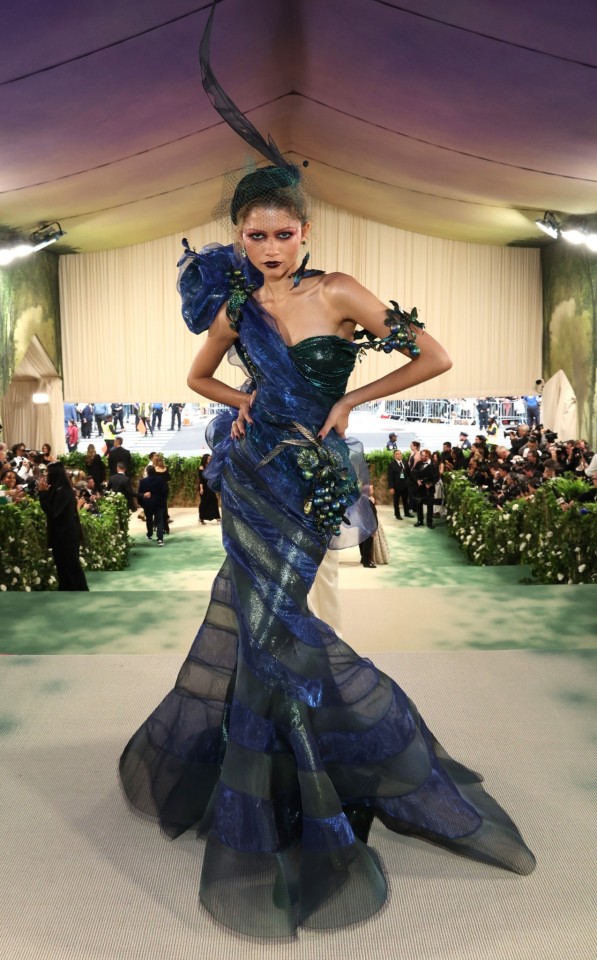
Zendaya at the Met Gala 2024, wearing custom Maison Margiela Artisanal by John Galliano, and hat by Stephen Jones.
The fruit, flowers, insects and birds on the gown fit the dress code of the night, 'The Garden of Time', inspired by J.G. Ballard's 1962 short story (explained here by the BBC).
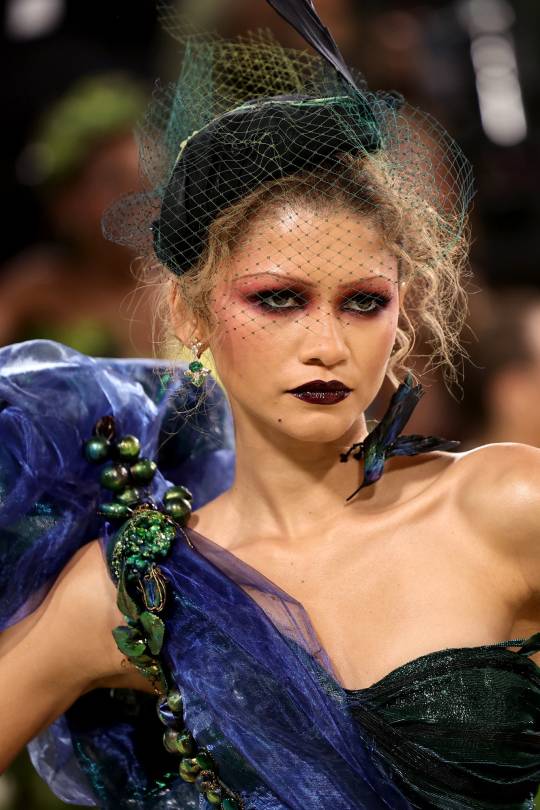
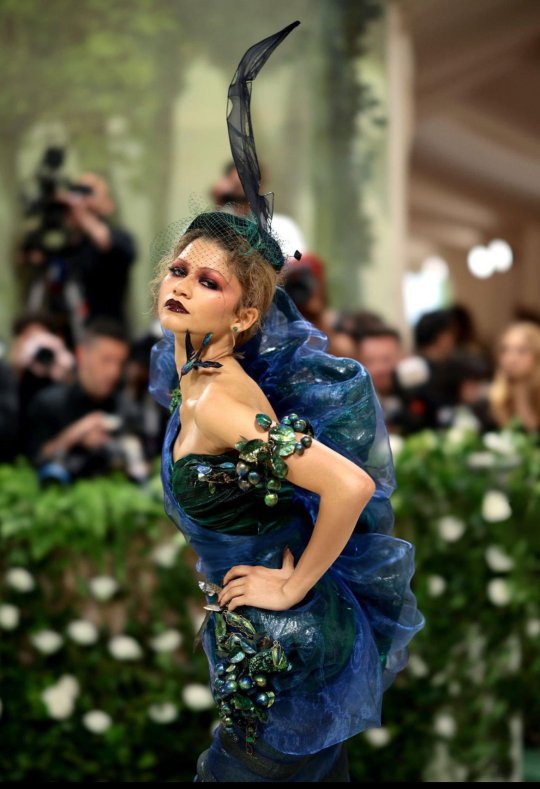
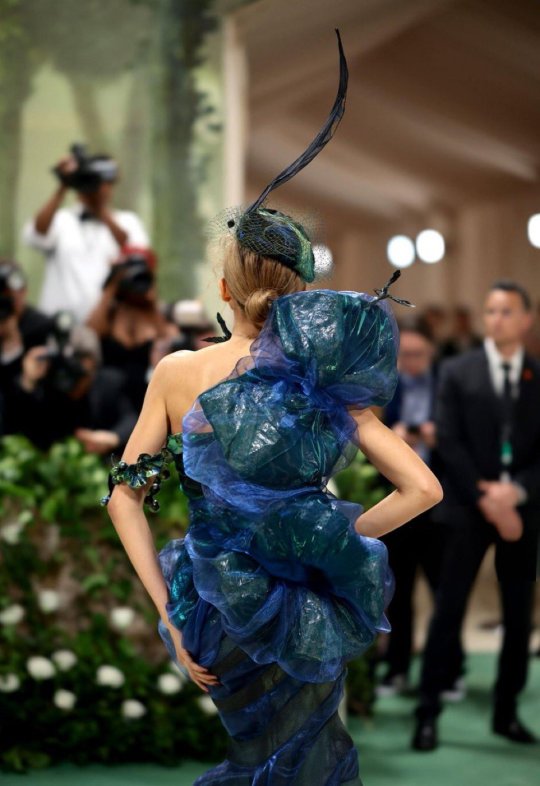
The gown also references John Galliano’s Spring 1999 couture collection for Dior, in particular the gown below, decorated with grapes.
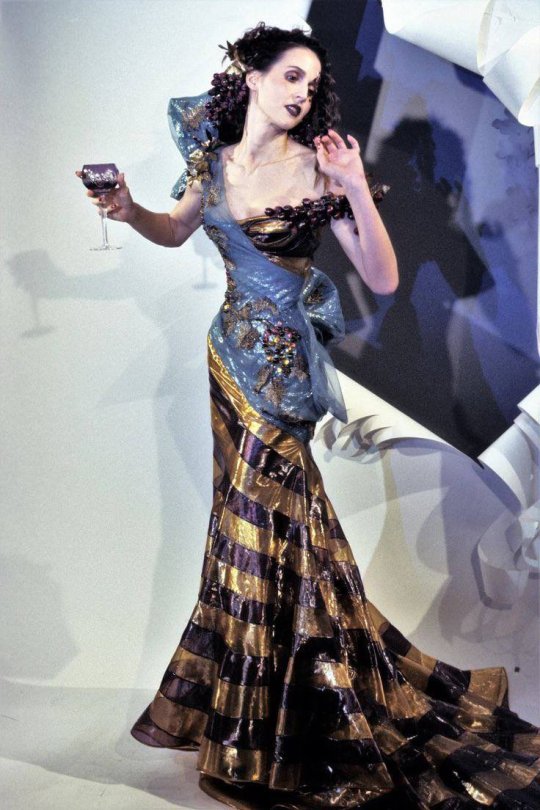
Maison Margiela said:
'A sage lamé bias-cut ‘siren dress’ overlaid with iridescent electric blue organza with ‘retrograding’ in undulating bands of hand-painted metallic crin, swathed in an aluminium material and iridescent organza drape and bow, with a corsage hand-embroidered in a bacchanal of hand-painted impasto in the grammar of the electric blues and emerald greens of scarab amulets, with formations of birds, flowers, vines, grapes and nuts, worn over a boudoir-coloured duchess satin corset. A silver metal-wire ‘reverse swatching’ hat and a black hand-painted voile crafted in the memory of plume and enveloped in matching coloured stockings by Stephen Jones for Maison Margiela, and Eau de Nil velour and faux lizard Tabi interlaced ankle-strap pumps by Christian Louboutin for Maison Margiela.
Created for Zendaya by John Galliano for Maison Margiela, the haute couture silhouette was inspired by the 1930s mythological works of the photographer Madame Yevonde and imbued with the memory of the orgiastic sceneries of the bacchanals of Ancient Greece. In a dance between painterly cutting and draping techniques – unique to each layer of the construction – and the superposition of fabric textures such as tin foil with transparent iridescent organza overlay, the composition conjures the staccato brushstrokes of Giovanni Boldini. The bias-cut ‘siren dress’ is a key expression in the creative practice of John Galliano, which first appeared at Maison Margiela in the Spring-Summer 2020 Artisanal Collection. Infused with a certain ‘snobisme’, the look is given the epithet of ‘86 and Lexington’, a nod to the subway station near The Met.
The dress was crafted with ‘retrograding’, a technique through which variations of thread-work, appliqué or encrustation degrade from the bottom to the top of a garment like the linear base drawing of a painting that hasn’t yet been finished. The ‘reverse swatching’ technique employed in the hat exchanges the fabrics traditionally used for certain parts of dressmaking with materials of a contrasting value.' X
#zendaya#met gala 2024#met gala#red carpet#john galliano#maison margiela#maison margiela artisanal#gothic#jg ballard#the garden of time#sleeping beauties#dior#fashion#fashion history#stephen jones#surface pattern#textile design#textiles#madame yevonde#millinery#scarab#beetle#insects#grapes#vines#nuts#flowers#floral#bacchanal#retrograding
270 notes
·
View notes
Text
Elder ᚠᚱᛖᛁᛃᚨ Younger ᚠᚱᛁᛁᛁᛅ
Freyja/Frøya (The Lady)
Epithets, Titles, and Kennings
Gullveig (gold-greed)
Vanadís (lady of the Vanir)
Gefn (giver)
Horn (flax)
Mardoll (root word Marr meaning sea. Sea bright)
Syr (sow)
Valfreyja (Lady of the Slain)
Lady of Fire
Heid (Völva from Voluspa)
Lady of the Disir
Prong (throng of the people?)
Skialf (This could be associated with a hall as most halls' names ended in this word, but also the name is associated with a wife who hung her husband a king)
Queen of Folkvangr
Chief of The Vanir
Queen of The Valkyrie
Possessor of The Fallen
Daughter of Njord (Dottur Njardur)
Sister of Frey (Syster Freys)
Wife of Od (Konu Od)
Mother of Hnoss (Modur Hnossar)
Processor of the fallen slain and of sessrumnir and tom-cats (eigandi vaffalls ok sessruimni ok fressa)
Of Brisingamen (Brisingamens)
Van-deity (Vana god)
Gondul ( a queen who makes two kings fight)
Astagud (deity of love)
Blotggdja (sacrificial goddess)
Of the Vanir’s consort (Brudr Vana)
Of Odr’s bedmate (bedvina Ods)
The god who’s weeping is beautiful
Ruling/Domain
Folkvangr is her realm and Sessrumnir is her hall.
(and is sometimes said to be where she takes her half of the dead but this is disputed)
Family
Njord is her father originally hailing from the Vanir but was exchanged as a hostage to the Æsir with his children (Freyr and Freyja). He is a god of ships and wind, commonly associated with wealth. Her mother is never mentioned but is speculated to be Skadi or Njords sister, an unnamed Vanir goddess, a final theory being Nerthus. A Germanic goddess from the time of Tacitus, during his accounting supposedly a goddess was worshiped all over Gaul. Her idol was brought around in a cart and kept in a sacred grove.
Her twin is Frey(r), and he rules over Alfheim. They make up a commonly seen idea of the worship and presence in mythology around the world of twin gods. Their names, which we commonly know translate to “Lord” (Freyr) and “Lady” (Freyja), are speculated to account for a fertility cult surrounding the Vanir possibly. During the Lokasenna, Loki accuses the two siblings of incest during his slander.
“Loki spake:
32. "Be silent, Freyja! | thou foulest witch,
And steeped full sore in sin;
In the arms of thy brother | the bright gods caught thee
When Freyja her wind set free." (The Poetic Edda, Translation by Henry Adam Bellows)
We have no other evidence to support this idea apart from the belief that the Vanir practiced incest in marriage and that Njord possibly was married to a sister at one point in time but still no evidence upholds these claims. Both Freyja and Freyr share a vast association with fertility and the land they also both are depicted to ride a boar and at a point, they each are mentioned riding a boar named “Gullinbursti” (“Golden-Bristles”).
She has 2 daughters Hnoss and Gersemi both of which translate to "treasure" though only mentioned in Christian sources and Gersemi is only mentioned once. In the Eddas, it says she has a husband named Oðr which is one of Odin's names, and gets into the Frigga and Freyja debate.
History
Getting into the debate on Freyja and Frigga it’s a tough battle between the texts, history, and linguistics. In the myths it’s very evident that they are separate goddesses with different personalities and attributes, Loki in the Lokasenna insults them both separately. From their names as we know them now Freyja only translates to “Lady” and Frigga means “to love” and we see that repetition across old Norse and Proto-Germanic with her name, we also see that Frigga's name is the closest associated to the word “Friday” with the days of the week transferring from the Romans to the germanic tribes we see how simply they took the names of the Romans gods and swapped them for associated Scandinavian gods, going from the romance language meaning “Venus day” to “Frigs day” as her germanic translations were so closely associated with love, which is another cross between her and Freyja, Frigga commonly is seen as a more domestic goddess and a wife, we see Freyja as this love goddess and in the text especially by Snorri Freyja is sexualized and made to be a promiscuous goddess, which could easily be that we are seeing what was once one goddess split into two versions or faucets of what they were before. One other confusing part for many people is Freyja’s husband Odr who is known to be the god Odinn. Freyja is also known heavily for her weeping when off searching for her husband, during Baldur's death Frigga's exaggerated focus is her weeping, which could easily be nothing important. But modernly the generally acceptable answer is that they are two different goddesses both important in their own right and status.
Frøya has a necklace she always wears. Its name is Brisgamen is a torc/necklace made by the dwarves and frøya supposedly spent a night with each of them who made it to get Brisingamen. In other myths Thor wears it dressed as Frøya during the fake wedding to Thrym the giant who stole Thor's hammer, then when Loki stole it and gave it to Odin. Odin made her start a war to get it back.
She also had a Boar named Hildisvini "Battle-swine" which she turned her husband oðr into and rode in one of the myths.
In the Grimnismal translation, it says "then" Odin picks not "and" giving the idea Freyja picks first but it's never mentioned otherwise. But modernly we accept that she does have the first pick. Gullveig is believed to be another name for frøya, she was a sorceress who predicted the Æsir, Vanir war and was burned alive 3 times by the Æsir each time coming back to life and was struck by spears and still didn't die.
She, like Odin, was known to use many different names throughout the myths and in her travels. She's the one who taught Odin and the other Æsir gods how to do Seidr magic. After the Æsir, Vanir war they exchanged hostages, and Frøya, Njordh, and Frey went to live with the Æsir in Asgard.
The Dís or Disir are referenced very often, always female, some called them female ancestors or fate goddesses which would include them in the Norns but they're also mentioned as Valkyrie in a sense as the Valkyrie were the Helpers of Odin and Freyja, they choose the who will fall and who lives during battles, etc. But most translations of the word Dís translated in Old Norse to "Lady", which is one of the same translations of Freyja, as Freyr and Freyja are "Lord" and "Lady". But then you have the many names used for Freyja, one being Vanadis, which they say means Lady of the Vanir (Vanir is one of the tribes of gods), but also some believed it meant that she was "the great dís" or Lady of the Disir Vanir, but it is known that they would call Freyja "Queen of the Valkyrie" and by translations possibly leader of the Dís, which then leads to more questions on the connection between the 2 (dís and Valkyrie). It’s known that Odin had his group of Valkyrie but that he had a group of "women" called "Odins Dís". Then you have 2 celebrations throughout the year, Disablot and disthing (this one has different names) which seem to mark the coming and going of winter, but also were more secretive and mainly within the home, some believed to be drawing down the ancestors magic from the alfar (elves) which with Freyja association to being "mistress of the home" (gets into the debate on her a frigg) and the name of the celebration may not have been the elves but the Dís possibly either as female ancestors or believe in ancestral connections to minor gods as a societal whole. Considering it wasn't uncommon for nobility to claim ancestry of some of the more famed gods (Odin, Freyr, etc)
Of course, Freyja is now a major goddess, if she wasn't before or even if she and Frigg were once the same being. They are now spilt just as Freyja is now much more important, but seeing the translation of Vanadis possible as "The great Dís" and Freyja having a connection to Gullvieg being Freyja and the connection to Freyja having rulership over Seiðr, etc. Could connect her to have been simply a leader of the Dís and or Valkyrie, and maybe it wasn't even her actual name considering Freyja translates to Fraujō in proto-Germanic, which becomes Frau in modern German, Frau means "woman" leading to the idea Freyja meant "Mistress" or "Lady" which is a title, not a name, which is interesting anyways. But of course, taking into account Old Norse poetry all the gods had different names and kennings. Which could mean we lost her original name.
The myths never actually show her as a Vølva but her association with magic gives us the idea she is along with the repeated idea that she was a goddess of sacrifices and that she was a “priest” in some texts, with the further association to gullveig this leads to the association that she could be a volva.
She has been described as having a chariot pulled by cats but they’re most likely domestic house cats based on the translations in stories the words used to mean only “cats” and if they were lynx or larger cats many translators believe the word directly referred to those animals would’ve been used instead, many older stories passed down orally mainly referred to her cats to be larger but we have no further evidence for either side.
Historical worship/practice
She had a fertility cult in the Viking age that stopped due to Christianity and a cult that lasted up until Snorri's age and time but that stopped soon after.
Hǫrg hann mér gerði, hlaðinn steinom,nú er griót þatat gleri orðit; rauð hann í nýionauta blóði, æ trúði Óttarrá ásynior (Hyndluljóð st. 10).
(He’s made a sanctuary for me, faced with stone, now that stone has turned to glass; he’s reddened it with fresh ox blood, Ottar has always trusted in the goddesses.)
This is one of the only examples of her worship or any goddess worship in the texts.
She and Frigga were called on during childbirth, and historically, our source came from a midwife.
In history, women of higher status would be named after Freyja in a sense being called “Fruvur” (ladies). Referring to the text before we see that many women who ruled over the household would be titled in her honor showing her ruling over the home at those times.
Associations
Death
Love
Lust
Magic (especially Seidr)
War
Cats
Wealth
Divination
Fertility
Beauty
Glory
Days of the Week
Friday, “Frigs day”
Special days
Alfarblót
Disablot
Elements
Fire
Numbers
9- Nine is a number found everywhere in Norse mythology, although nobody is sure why as it’s never explained anywhere.
Colors
Gold
Light Pink
Green
Copper
Silver
Yellow
Light Purple
Red
Brown
Animals
Cats
Horses
Boar/Sows
Rabbits
Swallows
Lynx
Falcons/Birds of prey
Ladybugs
Cuckoo
Plants and Flowers
Basil
Roses
Roseroot
Common Valerian
Mugwort
Rosemary
Apples
Primrose
Raspberries
Strawberries
Cinnamon
Poppy's
Daisy's
Almonds
Hay
Snow Blossoms
Linden
Essential oils/incense
Strawberry
Lavender
Lilac
Juniper
Cinnamon
Any sweet scents
Any baked good scents
Amber
Mint
Peppermint
Rose
Mulberry
Rosemary
Vanilla
Jasmine
Cypress
Sandalwood
Myrrh
Birch
Crystals and Metals
Rose quartz
Amber
Gold
Carnelian
Citrine
Any moonstone
Malachite
Black Tourmaline
Pink Tourmaline
River rock
Rubies
Divinational associations (runes/tarot)
Fehu, Sowilo, Berkano, Queen of wands, Queen of swords, The empress, The high priestess, The lovers, The star (Wildwood deck The Seer, and The Woodward)
Offerings and Devotional acts
Any Meads
Flowers (pressed or fresh)
Anything handmade for her
Stretching
Learning sword work
Exercising
Things are respectfully taken from nature
Jewelry
Poetry (especially traditional Norse)
Hot chocolate
Any tea
Wine
Sweet drinks or spices like cinnamon
Potatoes
Stews
Any meats
Any Berries
Ethically gathered Bones, Cat claws, and cat whiskers (DO NOT HARM AN ANIMAL FOR THESE)
Self-Care
Spending time in nature
Learning runes
Learning distaff spinning
Any imagery associated with her
Learning magic or divination
Any baked goods (bread, muffins, honey cakes, etc)
Honey
Honeycomb
Cat statues
Boar imagery
Fostering cats/kittens
Lighting candles every day in her honor
Burning incense for her (she likes things with flames or burning)
Bonfires
Flax bundles
A staff making a staff for your craft if you practice Seidr they are commonly used in it and you could make your devotional staff for that and have it by her altar.
Braiding your hair
Support women’s rights
Start a flower garden
Care for your significant other
Volunteer or support shelters
Honor your ancestors
Feed strays
Chants
Runic Chants/chanting the runes
Old Norse songs
(Both are commonly used in seidr)
Poem to Freyja-
https://www.tumblr.com/tears-of-amber/747489845291679744/freyja-in-the-honeysuckle-breeze-freyja-in-the?source=share
SOURCES
Poetic Edda translated by Jackson Crawford
Tales of Norse Mythology by Helen A. Guerber
The Norse Gods and Goddesses (Intro.)
Frigg and Freyja
The Vanir
The Vǫlva (Norse Seeress) and Seiðr
Valkyries (Valkyrjur)
Fólkvangr (Folkvang)
THE NORSE GODS: FREYJA || General info, what working with Freyja is like and offerings
Freyja (Freya) Norse Goddess of Love, Warriors, and Cats
My Experiences with Deities: Freyja
Seiðr Magic and Gender
https://teaandrosemary.com/freya-goddess/
https://study.com/academy/lesson/goddess-freyja-facts-symbols-norse-mythology.html
https://historycooperative.org/freyja-the-norse-goddess-of-love/
https://historiska.se/norse-mythology/freyja-en/
https://hrafnar.org/articles/dpaxson/asynjur/freyja/
https://www.britannica.com/topic/Freyja
https://www.northvegr.org/nordic-goddess/froya-freyja
https://www.spiritualityhealth.com/freyja-sensuality
https://www.voluspa.org/index.htm
https://sacred-texts.com/neu/poe/poe10.htm
https://www.academia.edu/90730001/45_Freyja
https://www.academia.edu/9715739/The_Cult_of_Freyr_and_Freyja
gods and myths of northern Europe
by h.r. ellis davidson
norse mythology - guide to the gods, heroes, rituals and beliefs
- john lindow
https://www.tumblr.com/fjorn-the-skald/153799577907/kennings-for-the-vanir-sk%C3%A1ldskaparm%C3%A1l?source=share
https://www.tumblr.com/broomsick/760015871374721024/i-want-to-ask-a-question-would-freyja-be?source=share
https://www.tumblr.com/tears-of-amber/714440167683964928/freyja-a-deity-deep-dive-some-upg?source=share
https://www.tumblr.com/chaos-bites/746330888775909376/subtle-freyja-worship-honor-passed?source=share

#witchythings#witchblr#witch community#study notes#goddess freyja#freyja#norse pantheon#norse paganism#norse gods#norse mythology#norse#norse heathen#aesir#vanir#goddess#cats of tumblr#cat#cats#beginner witch#witchcraft#witch tips#witchcraft community#divination#paganism#nordic#freya#frøya#witchyvibes#goddess information#norse inspired
93 notes
·
View notes
Text
Hey Guys!
So since there’s been SO much support for the potential of Epithet Exchanged, I’d figure I could give you guys a lil treat! Character redesigns! As well as… SOME NEW ONES!! (Electric guitar noise)
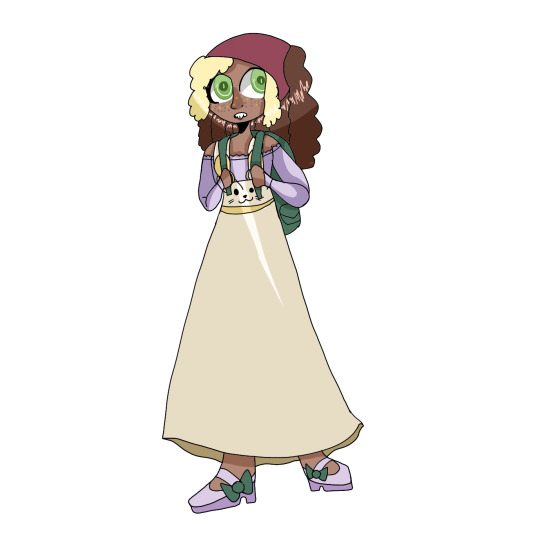
Lorelei Blyndeff

Molly Blyndeff/Ursa Archer
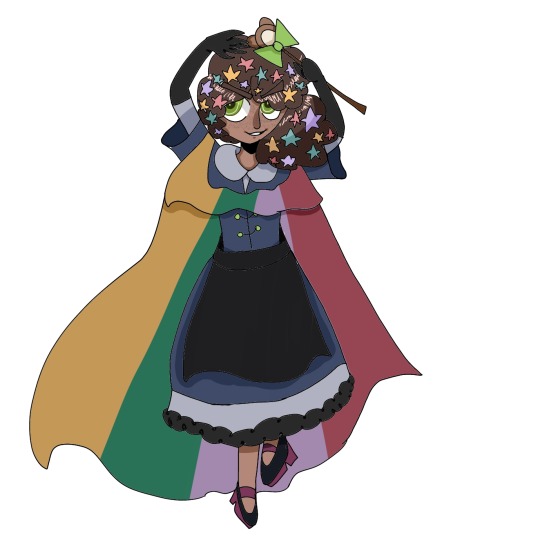
Molly Blyndeff/The Bizard (get it? Like bear wizard? I’m hilarious)
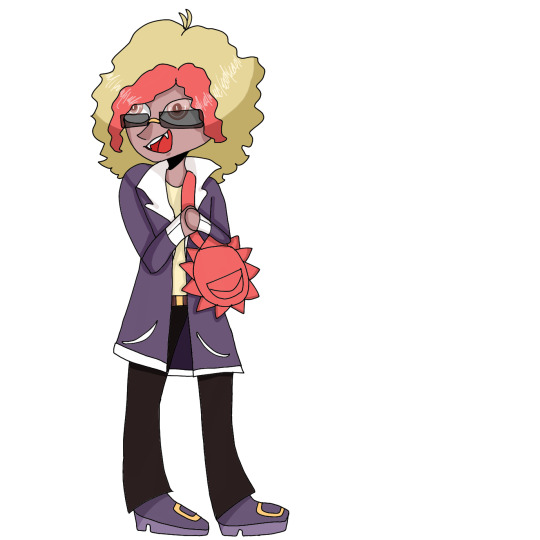
Rick Shades XV

Phoenicia Fleecity
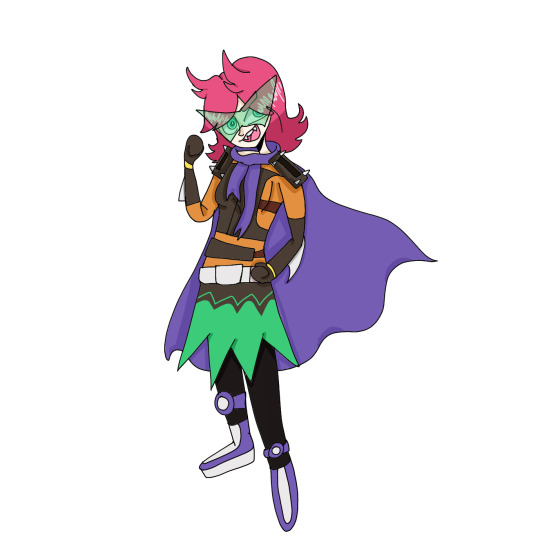
Trixie Roughhouse/Victoria Superbad

Giovanni Potage
This is no where NEAR the amount of Characters in Exchanged, BUT this was a fun thing to do! As a Naven appreciator, Naven n Yoomtah get their own post
CANT WAIT TO SEE YA IN EXCHANGED
#epithet erased fanart#epithet erased molly#epithet erased#epithet erased giovanni#epithet erased lorelai#digital art#art#epithet oc#prison of plastic spoilers#epithet erased prison of plastic#prison of plastic#fanart#epithet erased Vincent murder#trixie roughouse#epithet erased rick shades#rick shades#Phoenicia fleecity#epithet erased percy#epithet exchanged au#swap au#Victoria Superbad#anime campaign
22 notes
·
View notes
Text
Venti headcanon alphabet!
Kinda important note? I do like following Canon closely for these so while they are definitely heacanons, to me these are closer to educated guesses ^^
A-nger: How do they handle their anger?
Venti handles anger with grace 99 percent of the time. The only times we see him 'give into' anger, or even just annoyance feels deliberate. Like I refuse to believe he'd let slip to Diluc that he's "way older than him" (paraphrasing a direct quote from the quest where we steal the holy lyre) in such a dire situation just because he got mildly annoyed by being told he looks too young to drink.
I think Mondstatd and or it's citizens itself would have to be in severe danger to actually piss him off, and even then I definitely think Venti goes full Barbatos mode and just silently deals with the threat. His anger turns into determination very quickly.
B-etter: How have they, or how would they go about bettering themselves?
This is a question that depends on what exactly happened during the cataclysm on Khaenr'iah.
Under the assumption and my personal theory that Venti had little choice in participating in Khaenr'iah, which is implied through a few different things.
Zhongli's contract with celestial in regards to the cataclysm, a contract that makes it so he cannot speak on the matter at all, and which seems to take HEAVY advantage of Zhongli's role as the archon of contracts and therefore implies he might have been in someway coerced into said contract.
Venti's subtle but active dislike(distain) for celestia, referenced in a voiceline when Traveler asks abt it.
And the unspoken inability for the archon to go against their stated epithets. Throughout Genshin the archons time and time again for whatever reason seem to be unable to go against their secondary epithets/title.
Zhongli agrees to and stays true to contracts even when breaching them would be more beneficial in the long run.
Ei adhered to the concept of eternity even when it was actively hurting her people and she only stopped when her concept of eternity was redefined as opposed to giving up on eternity whole sale.
Nahida gave up the gnosis in exchange for wisdom/knowledge even though she actively despised Dottore.
If we assume the archons can't go against one of their own key principles, then Venti as the archon of Freedom would never support much less participate in the calamity of Khaenr'iah. I could see him maybe not getting involved, but I can also see him wanting Monatadt to be truly free from all rule, which would include celestia. If anything Venti would want to fight with Khaenr'iah.
Unless Venti was forced.
Celestia is incredibly powerful, and we know by the celestial nails AND the heavenly principles that they have no problem imposing their power onto entire nations. I genuinely believe that celestia threatened Mondstatd in some way, likely by using Venti's own title against him by threatening a forced monarchy onto Monstadt.
I honestly don't think Venti would participate in the cataclysm willingly. I think the closest you'd get is him participating without goading from celestia, but still being motivated by fear of what they'd do to Mondstadt.
Regardless on if you believe my take or not, I think in Canon we see Venti bettering himself. I think his disapproval of celestia and the implications of him willingly giving Singora his gnosis (only pretending to protect himself) is enough to tell us he stands with the Tsarista, who is motivated by the fall of Khaenr'iah in some way, and is seemingly collecting the gnosis to inevitably wage war against celestia.
I think regardless on if he willingly participated or not, I think Venti feels very guilty, and is doing all he can to support the inevitable war whilst also keeping Monstadt safe.
C-hange: How much have they changed? Is it for the better or worse?
This one is really odd to answer since we don't have a full picture on how the archons as a whole used to be.
I don't think that as much as people joke about Venti being lazy, ditzy, and an all around absent archon that he DID start out that way. He was a wind spirit, just a little whisp guy as jovial and free from responsibility as can be. I think the Venti persona we currently get is a reflection on how he started out and how he wishes he could truly be.
D-aily: What’s their daily routine?
We actually get a tiny Canon glimpse of this in his birthday art!
Where he has a house... or an apartment...
Ok I know I said I followed Canon but this is one of two Canon features I do not engage with out if pure selfish indulgence.
In my world view the bard does not have a house dammit.
Anyway.
Venti doesn't have a routine, he literally and figuratively goes with the wind. Sometimes he wakes up at 5 am, others it's 5 pm. He does always make a point to give Mondstadt a look over at least once a day, just to make sure everything is alright. He also always does his braids, it used to be a sacred point for him, but the longer he spent in the nameless band's body the more he just accepted it as his own body in multiple ways, so now he does his braids mostly out of habit.
Tries to talk with Dhalia once a week, tries to drink once a week, but neither are fully concrete.
Might do more of this ltr, might not. Yell at me if there's spelling mistakes pls.
27 notes
·
View notes
Text
If You Want An ACTUAL 'Feminist Icon' Man With Depth, Then Ares Is Your Best Candidate (NOT Hades!)
He has been SEVERELY misrepresented. Wonder Woman, Percy Jackson, DC Comics ... why didn't God of War use Ares instead of Kratos who is just one of Zeus' lieutenants?
(Don't get too excited just yet, it's still a pretty low bar.)
1) Ares is quite literally the ONLY Greek God (sitting on the Twelve Olympians) who doesn't need to be put on an sex offender registry. (I won't speak for his Roman counterpart, Mars, however ...) The worst he ever did, was seduce Phylonome, an hunting companion of Artemis, in the guise of an shepherd. That's hardly comparable to Zeus seducing Callisto in the guise of Artemis, or Alkmene in the guise of her husband Amphitryon, or Poseidon seducing Tyro in the guise of the river-God Enicepus.
That's right, the 'sacker of cities' isn't a rapist himself. (If you don't like irony, then Greek mythology isn't for you.)
2) Not only is Ares the only one who isn't a rapist, but he has actually stood up for sexual assault survivors more than once (even if they're his mother or daughter!) Ares was famously tried (and acquitted!) for homicide by a jury of the Twelve Olympians, after he slew Poseidon's son for raping his daughter. In one version of the myth, he was found guilty and forced to serve among mortals (which was the same sentence Zeus gave Poseidon and Apollo for conspiring against him). The implication is that all the Goddesses voted to acquit, all the Gods voted to convict, and what with Poseidon as prosecutor, Zeus as judge, and Ares as defendant, there were more goddesses on the jury than gods. Even if Zeus cast his vote to convict, it would have come to a tie and the rule was that the defendant is to be acquitted if there is a tie. (This is what occurred in The Oresteia, the setting of which was also the Areopagus.) When two giant sons stormed Olympus with the intention of taking Hera and Artemis, Ares was trapped by them in a jar, and the implication was because he was defending his mother and he was only a child at the time. He was also present at the punishment of Ixion who attempted to violate Hera, alongside Athena and Hermes.
3) Ares is the father of the Amazons (you hear that, DC Comics?) The founder of the Amazons, Otrera (who, btw, is the mythological founder of the Temple of Artemis at Ephesus), is either his daughter with the wood-nymph Harmonia, or his consort (if she is the daughter of Eurus, God of the North Winds) by whom he fathered Melanippe, Antiope, Hippolyta, and Penthesilea. Their nation's capital city is named Themiskyra in honour of Themis (Zeus' second wife and his aunt by whom he fathered three daughters), whom Ares is on surprisingly close terms with (see the Homeric Hymn to Ares), since he was also the patron god of the law enforcement.
4) One of Ares' epithets is 'feasted by women', in the ancient city of Tegea in Arcadia; during a war between the Tegeans and the Spartans, the women of Tegea defended the city from an invasion led by the Spartan king Charilaus.
5) Women abused by their husbands, as I've read online (but cannot verify), would have likely prayed to Ares for the strength to survive, which makes sense since he is the God of Courage (who else would they have prayed to?), which may have (sadly) further contributed to his unpopularity in Ancient Greece. Likely women also prayed that their abusive husbands would die violently on the battlefield in the next war ... He is, after all, the 'slayer of men'. It's not any different from how mothers would pray to Demeter to bring their daughters back alive, or unmarried girls would pray to Artemis to escape an unwanted marriage ... There's no 'protector of women in Greek mythology' because the Hellenistic religion worked through power bargains with the Gods and their respective domains ...
6) Aphrodite was forced into a marriage with Hephaestus in exchange for Hera's release (Hephaestus initially sued for the hand of Athena which ... didn't work out; see Erichthonius for more detail), Aphrodite expected that she would marry Ares. (They may or may not have been sleeping together before since Dionysus is the one who got Hephaestus drunk enough to do it ... Dionysus is the son of Semele, daughter of Harmonia, Ares and Aphrodite's daughter ... or maybe it's just the wonky timeline in Greek mythology ... ) Love and War. Their children are Eros (the literal Cupid himself) and Anteros (Unrequited Love), Phobos (Fear), Deimos (Panic), and Harmonia (Harmony). They have an open marriage (they are often acknowledged as each other's consort in mythology), despite Ares killing Adonis as a boar (although one version has Artemis killing Adonis as revenge for Hippolytus) and Aphrodite cursing Eos with insatiable lust. Spartans gave Aphrodite the epithet of 'Areia' (similar to how Zeus has the epithet of 'Heraion'). Note how Ares and Aphrodite are the only official couple, whether they're depicted as married or otherwise, on the Twelve Olympians (following her divorce from Hephaestus) besides Zeus and Hera themselves, which brings me to my next point ...
7) Even though Ares was not worshipped by many Ancient Greeks (just as they didn't feel comfortable even mentioning Hades by name), he was always depicted as an handsome soldier, which was the peak of male attractiveness at the time. Legally, he would have been considered as the 'legitimate' heir to the throne of Olympus as the only 'true' son of Zeus and Hera (since Hephaestus was conceived via parthenogenesis), given how the Ancient Greeks projected their own sociocultural norms onto their Gods. He is also one of the most handsome of Zeus' sons (along with Apollo, Hermes, and Dionysus). Bizarrely, he could almost be considered as Ancient Greece's cultural equivalent of Prince Charming in a roundabout way.
8) Ares is the son of Hera (the Goddess of Marriage, Family, and Childbirth, Patron of Women and Queen of Olympus) and the husband of Aphrodite (Goddess of Love and Beauty; Lust and Sexuality; Desire and Pleasure). He is also the rival to his half-sister Athena (Goddess of Wisdom and Reason; Strategy and Warfare; Arts and Crafts) for his father's affections, and shares jurisdiction with his half-sister Artemis over the Amazons. He's also on good terms with his grand-aunt, Themis, and I would assume his aunt Hestia. Zeus and Hera's other children are all daughters (Enyo, Eileithyia, Hebe, Angelos, Arge, Eleuthera), and a part of Zeus is concerned that Ares would overthrow him (more on that in another day, for another post). It's not hard to see why Ares drinks the Respect Women Juice unlike his father, uncles, or brothers.
9) People often use Ares persecuting a pregnant Leto at Hera's orders against him, disregarding that Hera is not only his mother but the Queen of Olympus. Even then, he never did anything more than deny her entrance to cities. The entirety of Ancient Greece itself was under orders to deny Leto sanctuary, and so are you really going to fault Ares for it? ZEUS didn't even hold it against Ares, even though he's his least favourite and Leto is his favourite woman ...
9) Ancient Greek mythology is largely passed through Athens, and they associated Ares with foreigners such as the Thracians (Thrace is said to be the God's birthplace) whom they regarded as stupid, uncivilized barbarians (see 6). His respecting women is likely meant to be seen as a negative trait, and highly correlated with how Ares was seen in general (see 3).
Note: I am NOT calling Ares an 'feminist icon' man, I'm just saying that he is the best possible candidate in Greek mythology.
116 notes
·
View notes
Text
Women in Mahabharata - Satyavati

She is the daughter of Dasha-raja, the leader of a fishers' tribe, and the protective matriarch of the Kaurava family.
As a child, she is abandoned by her mother, Adrika, at birth. Her father, the King of Matsya [noted as Uparichara Vasu, but most probably a descendant of his youngest son Mavella], takes her twin brother to eventually make him a commander of his kingdom, and she is left to be raised by Dasha-raja.
Dasha, most probably tired of listening to rumours about his newfound daughter, who he has nicknamed Kaali, moves out of Matsya, crosses the neighbouring Kuru kingdom, and eventually settles down by the banks of Yamuna, on the very other end of this kingdom.
When she is a teenager, she is spotted at her daytime job at the river by the rishi Parashara, who addresses her as 'Vasavi' and asks for a child. In exchange, Satyvati negotiates her way into a fresh identity: she no longer wishes to be known as 'Matsya-gandha' and Parashara promises her that, giving her a new epithet- 'Yojanagandha'. The child born of that negotiation is Krishna Dwaipayana Vyasa, the writer of the epic.
A few years later, Shantanu spots her in the same way as Parashara, and this time Satyavati, now a new adult, redirects the king to her father.
Dasha-raja, after Parashara's promise, has been receiving marriage proposals for quite some time now. However, considering the nature of Satyavati's birth and her association with the great rishi, Dasha is in a position to confidently refuse even the King of the land where he lives, citing better offers.
Dejected, Shantanu returns home, but soon his son Devavrata, only slightly older than Satyavati herself, approaches Dasha-raja on his father's behalf.
He listens to Dasha. Recognising the validity of his points and not willing to upset his father any further, Devavrata agrees to Dasha-raja's terms on the kingdom's behalf- promising that Satyavati's children and grandchildren would be the ones to inherit the throne and that he himself would remain unmarried to prevent squabbles over the throne after his time [so much for that!], and earning the epithet of Bheeshma.
Later, as we know, Satyavati's younger children, Chitrangada and Vichitraveerya, both suffer an untimely death, and she calls upon her eldest son, Vyasa, to give her grandchildren through niyoga.
Satyavati is a woman of many emotions, most of them conflicting. On one hand, she has grown up with love and rejection shaping her brain in equal parts. She rejects the name of Matsya out of her very justified anger at her birth parents, and is eager to please her actual father, no matter the cost.
We see gratefulness too, in her psyche, which is therefore wracked with guilt as she finds herself at the tail end of the previous biologically-Kaurava dynasty, mentally wrestling with her step-son who refuses to take the throne even when she begs him to do so.
She realises that she would be villified for eternity if her marriage [given it was already inter-caste, and at the cost of Bheeshma's life, and she still is blamed for it, somehow] were to become the downfall of this long-preserved lineage.
She is standing there, by the Kaurava throne, as a living proof of caste-mobility, a nail [not the final] in the coffin of caste-rigidity, and she is determined to keep it that way, because if she loses, then everyone loses.
Hence, she takes drastic measures, becoming the same 'villain' she was trying desperately not to be, by pushing her daughters-in-law into an experience which was undoubtedly the most traumatic one of their lives.
She is lucky too, for she finds in life two great friends- her stepson Bheeshma, and her son Vyasa. Both of them stand by her through the most difficult parts of her life, they stand up for her identity and her marriage, they fight the good fight with her, and when it's time, they gently help her extract herself from the mess that the family becomes, and leave with her head still held high.
P. S. I really did drag around 900+ pearls by hand, and I am super proud of myself! 😁
#hindu mythology#art#original artwork#mahabharat#digital painting#women in mahabharata#satyavati#vyasa#bhishma#matsya#hastinapura
29 notes
·
View notes
Text
Everybody loves to consider Greek mythology as a world of clear-cut deities with specific roles and defined limits between them, but it isn't true - and looking at how the deities changed, evolved and mixed together throughout the times is always a deeply rewarding experience.
One example I can give you are the "alternate Aphrodites". Aphrodite was one of the main and most important goddesses of Greek religion - as such she existed with many local variations, specific epithets and alternate cults. But many of these alternate deities ended up actually fusing Aphrodite with or having her replace other gods - a confusion between deities reflected by their very myths and legends.
The most famous case is the "Aphroditos" that was honored in Chypria: the "phallic Venus", the "bearded Aphrodite", an Aphrodite with male and female attributes honoring a mix of both female and male sexualities - and which according to records was linked to rituals of genders exchanging clothes, and other ritual crossdressing. It has been attested and confirmed that the "male Aphrodite", "Aphroditos" was the source of "prototype" for the figure of Hermaphrodite, the source of "hermaphrodism", and the male-female androgyne born in legends of the union of Hermes and Aphrodite - while also acting himself as an alternate form of Hermes in some places.
Hermes isn't the only lover of Aphrodite the goddess ended up confused with. Everybody likes to talk of "Aphrodite Areia", "Aphrodite of war", "Aphrodite in arms", the Aphrodite bearing weapons honored in more war-like cities and cultures of Ancient Greece, notably Sparta. This Aphrodite was usually coupled or paired with Ares, and legend does notoriously point out how the two were lovers. But in some areas, Aphrodite Areia was more than just the companion of Ares or an "Ares-influenced Aphrodite" - she was LITERALY the female version of Ares, replacing him. One same idea of a deity, for two genders.
And a last example I will point out is the Aphrodite Thalassa, or Aphrodite Pontia. "Aphrodite from the sea". We all know Aphrodite has a strong connection to the sea, since in the Hesiodic version she is supposed to be born out of it, and in religion she was considered a protector of sailors and ships. But further than that, you can see how deep her connection goes due to how in Greek religious (or non-religious) art, Aphrodite was often paired with Poseidon. It is something attested (you can check the book "The Twelve Gods of Greece and Rome", which studies the various depictions of the Twelve Olympians) - among the Olympians, when Aphrodite isn't depicted paired with either Hephaistos or Ares, she was usually paired with Poseidon - and when Aphrodite wasn't among the Twelve, she was replaced by Amphitrite, Poseidon's wife and queen. To the point that in many depictions it is hard to tell them apart - if they weren't fused in one...
Aphrodite's alternate self and "combo fusions" can even go in unexpected ways. Take the local cult, at the Hermione town, of Aphrodite "Nymphia" - Aphrodite the Bride, an Aphrodite of weddings and wives honored both by maiden virgins who were to lose their virginity upon their marriage night, or by widows who prepared themselves for a second union. This marital Aphrodite is the first step in the existence of another alternate self usually described as... "Aphrodite-Hera". And if you recall, back in The Iliad, Homer himself talked of how Aphrodite shared with Hera her belt of seduction to awaken the desire of Zeus... (Plus the fact that Aphrodite was said in the Homeric tradition to be the daughter of Zeus and Dione - Dione herself being literaly just a female verson/counterpart of Zeus ; and by extension later some people called Aphrodite herself "Dione" in reference to her mother, the same Helios in the Homeric traditon is also called "Hyperion" despite Hesiod splitting them in a father-and-son duo)
So yeah, sorry all of you who like neat classifications and little boxes that never get mixed up - but by the real facts, while Greek mythology as quite stable, it was also more fluid than you'd think, and the gods did have a tendency to fuse together...
(Cut to a long post about how Selene, Hekate and Artemis ended up all fused into the "Diana triformis" and the "Triple Moon" by Roman times)
#greek mythology#aphrodite#ancient greek religion#amphitrite#hera#ares#poseidon#hermaphrodite#hermes
135 notes
·
View notes
Text
Kinktober speedrun time! Used the Mirror prompt on this list. Thank you for the inspo! Further details below the cut so that the above the cut stays safe for anyone who is just scrolling through!

18+ Content MDNI || Dom!Reader x Leander

PROMPT/KINK(S): Dom!Reader, Mirror Use. Edging/Orgasm Denial + Light Degradation & Name calling (Leander being referred to as a dog but he’s really into it, promise) + Power Exchange & Sub/Dom Dynamics
OTHER INFO: Leander has a dick, anatomy of Reader/POV Character remains unspecified; "they" pronouns used.

Leander has the straight backed posture of a man who was given etiquette lessons. His mannerisms speak of wealth and class, yet they can’t help but observe that he looks completely comfortable while down on his knees.
His back muscles flex as he works himself, sweat slipping down his spine, pooling in the dimples just above his ass. He’s strung tight, the veins in his arms straining as he strokes a quick, even rhythm. His dick is flushed a painful red, copious amounts of pre-cum dripping down his wrist and splattering onto his thick thighs, some of it even dirtying the floor below when his strokes become too enthusiastic.
(They wonder how best to make him clean it later–he does so love to be ordered to lick up his own mess–but this floor is probably just as filthy as anywhere else in the Wick, despite appearances–and they don’t think they can find it in themself to make use of his mouth again after watching that.)
The full length mirror hanging in front of Leander is a new addition to the room. Something they’d wheedled out of him with nothing but an easy promise, whispered into his ear down at the bar. It was theirs not a full day later: a polished brass antique with a priceless clear finish.
His back is to them, but they can see everything they need to by gazing at his reflection.
His strokes stutter, faltering, and they watch as his abdominals jump rapidly. His hand makes a few more shaky attempts before he stops himself with a shudder, breathing hard and squeezing his cock at the base to cut off his own orgasm. They give a little hum of approval, waiting.
“Count.” They prompt, when he fails to remember on his own.
They watch his throat bob with effort as he swallows, his jaw trembling around his answer. “Five.”
“Good boy,” they say, their voice flat and unrewarding. Dismissive. "Guess that Hightown education really paid off for you, huh?" He whines at that, his palms slicking along his thighs, awaiting their instruction. He glances at them in the mirror, eyes hopeful. “Again,” they prompt, “and keep your eyes on yourself until I tell you. During, too. You were closing them a lot. It's just you and the mirror until you've earned otherwise.”
Bites his lip, beginning to stroke himself again.
The next edge comes more quickly.
His eyebrows draw up, mouth falling open, back arching. His cock jumps and this time he falls back onto his hands to keep from giving into temptation. His eyes travel the length of the mirror, his neck taught with tension as he pants. They notice his gaze darting along their form for a moment, greedily stealing along their silhouette in the looking glass. A quick glance of the place where their legs are splayed open as they lounge on the bed behind him, toying with themself idly.
He’s back to form so seamlessly, he probably thinks they didn’t even notice. The next number falls out of his mouth without prompting, as if to cover for his earlier sleight.
"..."
“Baby,” he whines, fidgeting without further instruction. His fingers return to his dick when they don't reply, ghosting over his wet, swollen cockhead. He knows they hate the way that epithet sounds in his voice, the condescending lilt he manages to wrap around the syllables. “Sweetheart. Please, may I–”
“Bad dog,” they admonish. They don't elaborate–let him figure out for himself which breach of protocol they're scolding him for.
“Again. And if you can’t behave, I’ll have to put you outside.”

18+ Master List | SFW Master List ✦Kinktober Speedrun on Ao3
Consider: this type of power play with yandere!Leander...you watching him when he's usually the one watching you...
#kinktober 2024#citrus fiending tag#tckinktober#18+ MDNI#see above tags for the tags you'll wanna blacklist if u don't wanna see me trying to speedrun this week lol#not pictured: POV character telling Leander that his ego is big enough that he should be able to get off without sneaking a peek at them :)#similarly not pictured: “we can use the blindfold if you *really* can't behave on your own.”#once I'm done speed running I'll maybe post a Kinktober 2024 Masterlist to the main tag but I'll prolly post in chara tags only for a bit..#leander x reader#leander touchstarved#touchstarved fanfic#something real nasty for those who partake <3#feels too awkward to tag someone in this out of the blue but SHOUT OUT IF U SEE THIS ty for the list!#Consider: this type of power game with yandere!Leander#you watching him when he's usually the one watching you#save me yandere leander#take me away from this life; i no longer desire to participate in capitalism#/joking i was joking omg did u hear that did it just get cold all of the sudde..........#touchstarved x reader#Touchstarved leander
60 notes
·
View notes